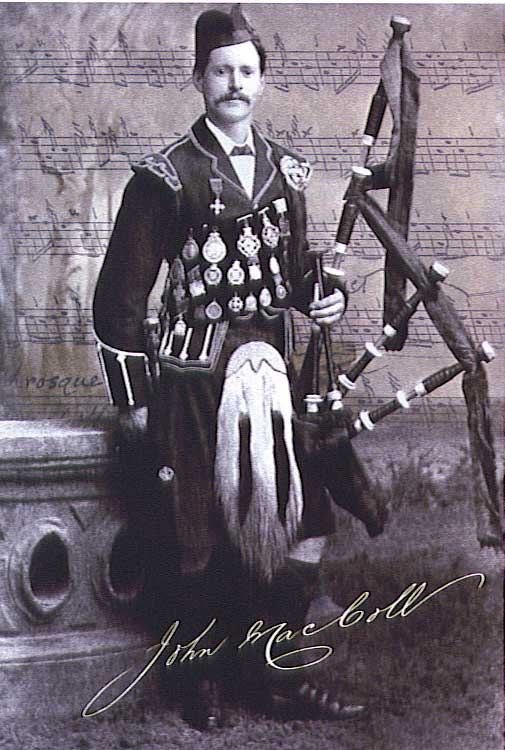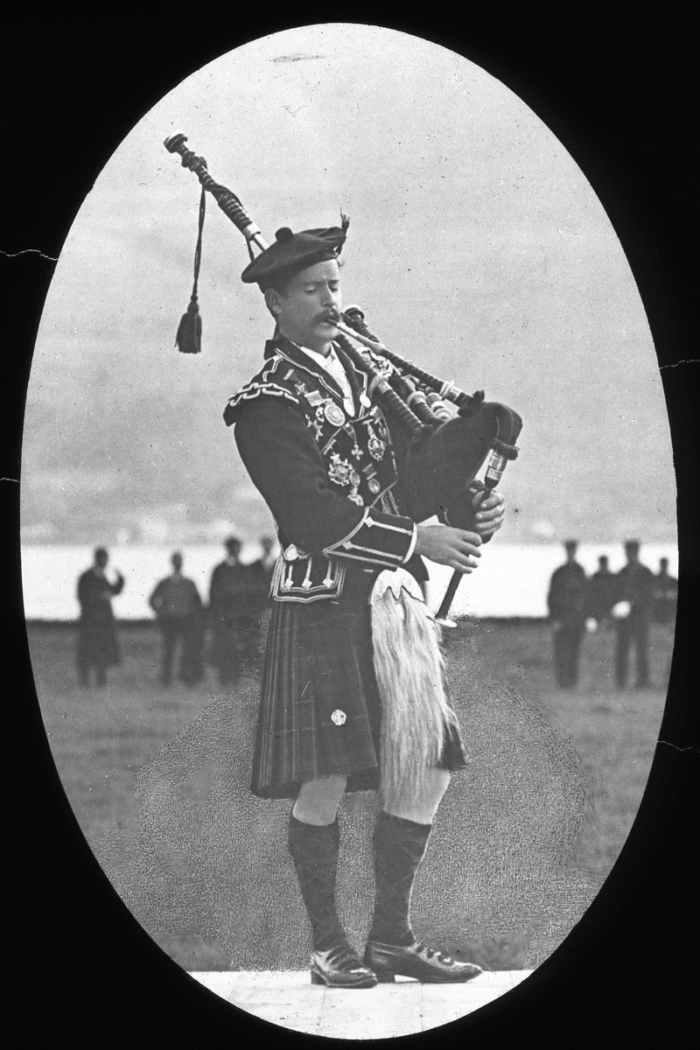John MacColl
(1860-1943)
 Seven of the greatest competition 2/4 marches –Mrs, John MacColl, Jeannie Carruthers, The Argyllshire Gathering, Arthur Bignold of Lochrosque, The Clan MacColl, Dugald MacColl’s Farewell to France andJohn MacFadyen of Melfort – all came from the fertile composing mind of John MacColl, one of the greatest figures from what is often regarded as piping’s ‘Golden Age.’
Seven of the greatest competition 2/4 marches –Mrs, John MacColl, Jeannie Carruthers, The Argyllshire Gathering, Arthur Bignold of Lochrosque, The Clan MacColl, Dugald MacColl’s Farewell to France andJohn MacFadyen of Melfort – all came from the fertile composing mind of John MacColl, one of the greatest figures from what is often regarded as piping’s ‘Golden Age.’
His greatness stems from more than just his bagpipe music. The 4th son of Dugald MacColl, a tailor and an excellent piper from Kentallen, he distinguished himself from his piping brothers by a desire not just to do well, but to be the best. He would excel not just at composing, but as a piper, a fiddler, a Highland dancer and an athlete.
Instruction came initially from his father, and then from the famous pipe music editor and player Donald MacPhee (1841-1880) and finally from Pipe-Major Ronald MacKenzie of the Black Watch (1842-1916), who won the Prize Pipe at Inverness in 1873 and the Gold Medal there in 1875. His initial forays into competitive piping starting when he was 17 in 1877 were not particularly successful. He was competing against piping immortals like Robert Meldrum and John MacDougall Gillies and success was not immediate. But in 1880 he became piper to MacDonald of Dunach and was able to devote his life to piping. He won the Gold Medal at Oban the next year, the Prize Pipe at Inverness in 1883, the Former Winners’ Gold Medal at Inverness in 1884, the Clasp at Inverness in 1900 and first prize at the Paris Exhibition in 1902.
A professional piper, he competed everywhere, but not just in the piping. His son John once wrote of his father:
He did tell me of finishing a dance, throwing off his kilt (having running shorts underneath) competing in the hundred yards race and then putting his kilt and things on ready for the next dance. This, of course, was just as a professional to augment his prize money for the day. Naturally his major earnings came from playing the pipes, dancing and teaching.

Unlike today, the games circuit was lucrative for one so versatile, and the ability to earn £40 in an afternoon in the late 1800s afforded him the leisure to pursue yachting, golf, shinty, fiddling, Gaelic singing and composing.
He served as pipe-major of the 3rd Battalion of the Black Watch and after that with the Scottish Horse. He trained pipers and taught piobaireachd for the Piobaireachd Society.
Around the turn of the century he, Willie Lawrie and G. S. McLennan revolutionized the composition of light music, and in particular took the competition march form to a level that has not been equalled.
His piobaireachd playing received mixed reactions. He won the major prizes, but never dominated the piobaireachd lists as he could in the light music, where he was considered the best march player of the time. Some thought his piobaireachd playing lacked the expressive feeling of his light music, but John MacDonald of Inverness called one of his performances of “I Got a Kiss of the King’s Hand” at Birnam Games “one of the most harmonious performances I have ever listened to.” He composed three piobaireachd, two of which (Lament for Donald MacPhee and N.M. MacDonald’s Lament) won composing contests, and the third of which has been lost.
In 1908 he gave up the games circuit and joined the Glasgow firm of R. G. Lawrie as the manager of their new bagpipe making branch. John MacDougall Gillies was similarly in charge of Henderson’s pipemaking shop, and as a result, some of the greatest sets of pipes ever made came from these two firms during this time. MacColl retired from Lawrie’s in 1936. During those first few decades of the 1900s, he and MacDougall Gillies – who died in 1925 – helped build the Glasgow piping community into a centre of piping excellence that has continued to this day.
John MacColl died on June 8, 1943. John MacDonald of the Glasgow Police played Lament for the Children at his funeral.
JM, October 2006
-with notes from Piping Times, (February 1998, May 1970), ‘A History of Piping’ (Captain John A. MacLellan teaching handout, Army School of Piping) and ‘Pipers’, by Dr. William Donaldson, Birlinn Ltd., 2005.

6 Comments
Great write-up, Jim! Thanks for pulling together so much fascinating information and putting it in one place for all of us.
Does anyone know what make John’s pipes were and if they are still in existance?
Great stuff.
John MacColl’s pipes were silver and ivory Lawries. They are now on display in the Museum of the National Piping Centre in Glasgow.
Thanks Jim! Great information.
I play 1930’s Lawries and the tone is outstanding, These pipes were made while John MacColl was the bagpipe shop manager.
Hi Jim, thanks for the great wealth of information about John MacColl. I was doing a bit of research about this hugely talented piper and composer and was looking for a source where i could draw accurate info about the man and his music, looks like i found it! All the very best to you!
Hello Jim, Thanks for this invaluable information about John McColl’s life. I hope you won’t mind, but I have added a link to this page to my two YouTube videos of John McColl’s pipes being played by Angus McColl at this years’ ‘Piping Live’ festival:
https://www.youtube.com/watch?v=OyPFC4J09t0
https://www.youtube.com/watch?v=iGi1apz8DXM